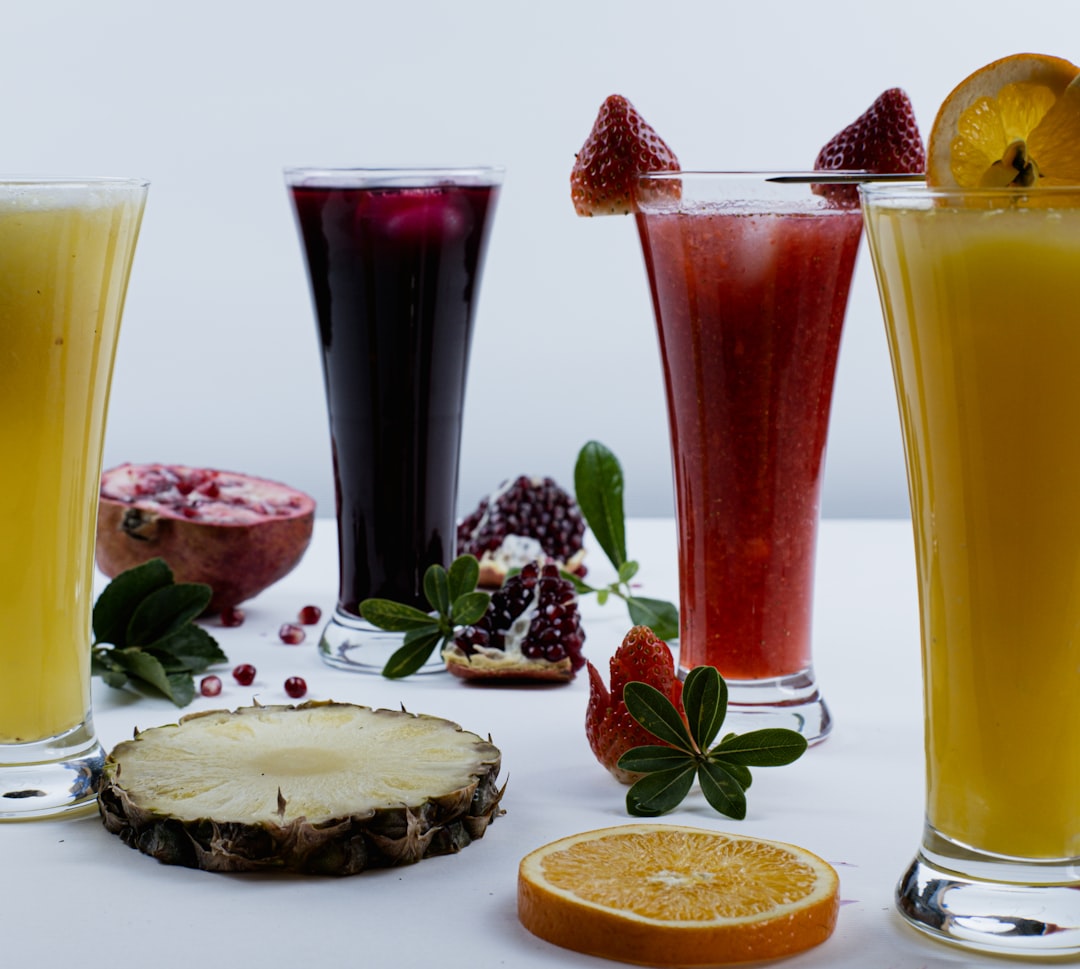In recent years, you may have noticed a significant increase in the popularity of fruit juice. This trend can be attributed to a growing awareness of health and wellness, as many people seek convenient ways to incorporate fruits into their diets. Fruit juice is often marketed as a healthy alternative to sugary sodas and other beverages, leading you to believe that it is a nutritious choice.
The vibrant colors and enticing flavors of fruit juices can be hard to resist, making them a staple in many households. As you stroll through grocery store aisles, you might find an overwhelming array of fruit juice options, from classic orange juice to exotic blends featuring acai and pomegranate. However, while fruit juice may seem like a wholesome option, it is essential to consider the implications of its consumption.
The rise in fruit juice popularity has led to an increase in marketing campaigns that promote these beverages as healthful. You might find yourself drawn to the claims of vitamins and antioxidants, but it’s crucial to look beyond the surface. As you delve deeper into the nutritional content of these drinks, you may discover that they are not as beneficial as they appear.
Understanding the complexities of fruit juice consumption is vital for making informed dietary choices.
Key Takeaways
- Fruit juice consumption has risen significantly in recent years, contributing to increased sugar intake.
- Many fruit juices contain hidden sugars, which can have negative effects on liver health.
- Excessive fruit juice consumption can lead to an increased risk of non-alcoholic fatty liver disease.
- There is a connection between fruit juice consumption and an increased risk of type 2 diabetes.
- Fruit juice can contribute to weight gain and obesity due to its high sugar content.
Hidden Sugars in Fruit Juice
One of the most concerning aspects of fruit juice is the hidden sugars that lurk within. When you pour yourself a glass of juice, you might assume that you are consuming a natural product, but many commercial juices contain added sugars that can significantly increase their calorie content. These sugars can come from various sources, including high-fructose corn syrup and other sweeteners, which are often used to enhance flavor and mask the acidity of certain fruits.
As you sip on your juice, you may unknowingly consume more sugar than you would from eating whole fruits. Moreover, even 100% fruit juice can be misleading. While it may not contain added sugars, the natural sugars present in fruit can still contribute to excessive calorie intake.
When you drink juice, you are consuming the sugars without the fiber that whole fruits provide. This lack of fiber can lead to rapid spikes in blood sugar levels, which can have detrimental effects on your overall health. Being aware of the sugar content in fruit juices is crucial for maintaining a balanced diet and avoiding potential health risks.
Impact on Liver Health

Your liver plays a vital role in processing nutrients and detoxifying harmful substances from your body. However, excessive consumption of fruit juice can have adverse effects on liver health. The high sugar content found in many fruit juices can lead to an overload of fructose, which your liver metabolizes differently than glucose.
When you consume too much fructose, your liver can become overwhelmed, leading to fat accumulation and inflammation.
As you continue to consume fruit juice regularly, it’s essential to consider how it may be affecting your liver function.
The liver’s ability to process sugars efficiently can be compromised by excessive fructose intake, leading to conditions such as insulin resistance and fatty liver disease. By being mindful of your fruit juice consumption, you can take proactive steps to protect your liver health and ensure that it continues to function optimally.
Increased Risk of Non-Alcoholic Fatty Liver Disease
| Factor | Increased Risk |
|---|---|
| Obesity | Higher |
| Insulin resistance | Higher |
| High blood sugar levels | Higher |
| High levels of fats in the blood | Higher |
| Metabolic syndrome | Higher |
One of the most significant concerns associated with high fruit juice consumption is the increased risk of non-alcoholic fatty liver disease (NAFLD). This condition occurs when excess fat builds up in the liver without any significant alcohol consumption. As you consume more sugary beverages like fruit juice, your risk of developing NAFLD rises due to the high levels of fructose that contribute to fat accumulation in the liver.
Research has shown that individuals who regularly consume large quantities of fruit juice are more likely to develop this condition. If you find yourself reaching for fruit juice frequently, it’s essential to be aware of the potential long-term consequences for your liver health. NAFLD can lead to more severe complications, including liver inflammation and scarring, which can ultimately progress to cirrhosis or liver failure.
By moderating your fruit juice intake and opting for healthier alternatives, you can significantly reduce your risk of developing NAFLD and promote better overall health.
Connection to Type 2 Diabetes
The link between fruit juice consumption and type 2 diabetes is another critical aspect to consider. As you consume fruit juices high in sugar, your body experiences rapid spikes in blood glucose levels. Over time, these spikes can lead to insulin resistance, a condition where your cells become less responsive to insulin’s effects.
This resistance is a significant risk factor for developing type 2 diabetes. Studies have shown that individuals who consume large amounts of fruit juice are at a higher risk for this chronic condition. Understanding this connection is vital for making informed dietary choices.
If you are concerned about your risk for type 2 diabetes, it may be wise to limit your intake of fruit juices and focus on whole fruits instead. Whole fruits provide essential nutrients and fiber that help regulate blood sugar levels and promote overall health. By being proactive about your dietary choices, you can take steps to reduce your risk of developing type 2 diabetes and maintain better metabolic health.
Effects on Weight and Obesity

As you navigate your dietary choices, it’s essential to consider how fruit juice consumption may impact your weight and overall health.
The high sugar content in fruit juices contributes to increased calorie intake without providing the satiety that whole fruits offer.
When you drink juice instead of eating whole fruits, you may find yourself consuming more calories than necessary. Moreover, research has indicated a correlation between sugary beverage consumption and obesity rates. As you indulge in fruit juices regularly, you may inadvertently contribute to weight gain over time.
This weight gain can lead to various health issues, including heart disease and metabolic syndrome. By being mindful of portion sizes and considering healthier alternatives, you can take control of your weight management journey and promote better overall health.
Potential Harmful Effects on Children
When it comes to children’s diets, fruit juice is often perceived as a healthy choice by parents seeking nutritious options for their little ones. However, it’s crucial to recognize that excessive fruit juice consumption can have harmful effects on children’s health. Many pediatricians recommend limiting fruit juice intake for young children due to its high sugar content and lack of fiber.
When children consume too much fruit juice, they may be at risk for developing dental cavities and obesity. As a parent or caregiver, it’s essential to educate yourself about the potential risks associated with fruit juice consumption for children. Encouraging whole fruits instead of juices can provide children with essential nutrients while promoting healthy eating habits from an early age.
By prioritizing whole fruits over fruit juices, you can help set the foundation for a lifetime of healthy choices for your children.
Comparison to Whole Fruit Consumption
When comparing fruit juice to whole fruits, the differences become strikingly clear. Whole fruits offer a wealth of nutrients, including vitamins, minerals, and dietary fiber that are often lost during the juicing process. Fiber plays a crucial role in digestion and helps regulate blood sugar levels by slowing down the absorption of sugars into the bloodstream.
When you consume whole fruits instead of juices, you benefit from these essential nutrients while also feeling fuller for longer. Additionally, whole fruits require more chewing and take longer to eat than drinking juice, which can contribute to better portion control and reduced calorie intake overall. By choosing whole fruits over fruit juices, you not only enhance your nutrient intake but also support better digestive health and weight management.
Making this simple switch can have lasting benefits for your overall well-being.
Overconsumption and Portion Control
As with any food or beverage, moderation is key when it comes to fruit juice consumption. It’s easy to overlook portion sizes when pouring yourself a glass of juice; however, many people underestimate how quickly calories can add up from these seemingly innocent drinks. A standard serving size for fruit juice is typically around 4 ounces (about half a cup), but many individuals pour much larger servings without realizing it.
To maintain a balanced diet and avoid overconsumption of sugars and calories from fruit juices, it’s essential to practice portion control. You might consider using smaller glasses or measuring out servings to ensure that you stay within recommended guidelines. By being mindful of how much juice you consume, you can enjoy its flavors without compromising your health goals.
Importance of Reading Labels
In today’s market, not all fruit juices are created equal; therefore, reading labels is crucial for making informed choices about what you consume. When shopping for fruit juices, take the time to examine ingredient lists and nutritional information carefully. Look for products labeled as “100% juice” without added sugars or artificial ingredients; however, even these options should be consumed in moderation due to their natural sugar content.
Understanding food labels empowers you as a consumer and allows you to make healthier choices for yourself and your family. By being diligent about reading labels on fruit juices, you can avoid hidden sugars and select options that align with your health goals.
Healthier Alternatives to Fruit Juice
If you’re looking for healthier alternatives to fruit juice that still provide delicious flavors and essential nutrients, there are plenty of options available. One popular choice is infused water—simply add slices of fresh fruits like lemon, cucumber, or berries to water for a refreshing beverage without added sugars or calories. Herbal teas are another excellent option; they come in various flavors and can be enjoyed hot or cold without any added sweeteners.
Additionally, smoothies made with whole fruits and vegetables offer a nutrient-dense alternative that retains fiber while providing a satisfying texture. You might also consider incorporating more whole fruits into your diet as snacks or desserts instead of reaching for sugary beverages. By exploring these alternatives, you can enjoy flavorful drinks while prioritizing your health and well-being.
In conclusion, while fruit juice has seen a rise in popularity as a perceived healthy beverage choice, it’s essential for you to understand its potential drawbacks. From hidden sugars and impacts on liver health to connections with obesity and type 2 diabetes, being informed about the effects of fruit juice consumption is crucial for making healthier dietary choices. By prioritizing whole fruits over juices and exploring healthier alternatives, you can take control of your nutrition and promote better overall health for yourself and your family.
Consuming fruit juice in excess can be detrimental to your liver due to its high sugar content, which can lead to fatty liver disease. This condition occurs when too much sugar, particularly fructose, is metabolized by the liver, leading to fat accumulation. An article on Explore Senior Health discusses the impact of high sugar intake on liver health, emphasizing the importance of moderating fruit juice consumption to maintain liver function and overall health. By understanding the risks associated with excessive fruit juice intake, individuals can make informed dietary choices to protect their liver and promote long-term well-being.
WATCH THIS! 🧃The 60-Year Liver Lie: Why Your “Healthy” Juice Is Destroying Your Liver
FAQs
What makes fruit juice bad for your liver?
Fruit juice can be bad for your liver due to its high sugar content, which can contribute to fatty liver disease and insulin resistance.
How does the high sugar content in fruit juice affect the liver?
The high sugar content in fruit juice can lead to an increase in fat production in the liver, which can contribute to the development of fatty liver disease.
Can fruit juice consumption lead to insulin resistance?
Yes, the high sugar content in fruit juice can lead to insulin resistance, which can further contribute to liver damage and the development of non-alcoholic fatty liver disease.
Are there any specific types of fruit juice that are particularly bad for the liver?
Fruit juices that are high in fructose, such as apple and pear juice, can be particularly bad for the liver when consumed in large quantities.
How does excessive fruit juice consumption compare to the effects of alcohol on the liver?
Excessive fruit juice consumption can have similar effects on the liver as alcohol, including the development of fatty liver disease and insulin resistance. However, alcohol consumption can also lead to inflammation and liver cirrhosis, which are not typically associated with fruit juice consumption.
